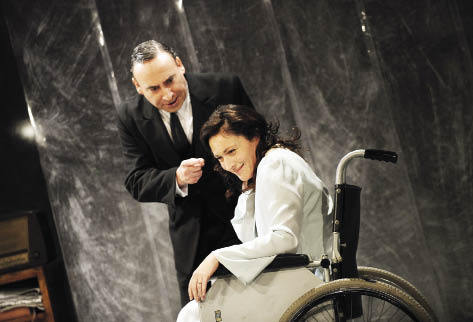Regime change at Hampstead Theatre. The era of special measures is over and Ed Hall, son of Sir Peter, has taken charge. Hall’s debut show is daring in its complete lack of audacity.
Regime change at Hampstead Theatre. The era of special measures is over and Ed Hall, son of Sir Peter, has taken charge. Hall’s debut show is daring in its complete lack of audacity. Shelagh Stephenson’s new play Enlightenment is the sort of bourgeois frippery we were used to yawning through under the previous administration. We’re in a posh house in Angstead Garden Suburb where two yuppie liberals are struggling to cope with the disappearance of their gap-year son in south-east Asia. Mum consults a psychic. Dad invites a TV producer to make a shock-doc highlighting their plight. When a confused drifter turns up claiming to be the lost Odysseus, Mum lets him stay in the spare room as an ersatz offspring.
This is a rather contrived way to explore the issues of bereavement and identity, and the play takes some decidedly nasty detours towards the end. Sliced flesh, bashed-out brains and multiple ketchup spillages are involved. And yet this undemanding show kept me engaged throughout. The theatre was full. The audience was attentive. Many of them were young but they didn’t cough, fidget, gossip or text. And the script got plenty of big laughs. These may sound like negligible achievements but they’re fundamental, and if you don’t secure your foundations you fall through a hole and never reappear. Ed Hall elicits a great performance from Daisy Beaumont as a manipulative TV executive, and Richard Clothier is sublimely funny as the agitated Dad who calls Mum’s hired psychic ‘that twat in a cardigan sniffing my son’s socks’.
The show’s real star is Francis O’Connor’s absurdly flashy interior. Two parabolas intersect to reveal a concavity of blazing white, like an eviscerated egg, magnified and ornamented with telling details. It’s an oval that deserves an ovation. Bookshelves rise and fall at a button’s touch. The walls are a majestic sweep of achingly perfect white oblongs that overlook a hidden stairwell whose steps sink into the house’s stylish lower quarters. The set cries out for a solo show, for a dedicated space, for a museum of its own where nodding graduates can ponder the genius of its omni-specific lack of specificity.
To his credit, Hall has made O’Connor’s virtuosity work for the play rather than against it, by punctuating each scene with a power surge of brilliant light that rebounds off the set like a solar IED or a Hiroshima flashback. The effect of this photo-voltaic explosion is physical, literally. It’s like getting a smack in the eye. The trick is exuberant, self-admiring and rather unnecessary but somehow enjoyable, too. Like the show. A tentative start for Hall but surely better things await us.
Visual stylings that don’t elucidate or complement the drama must sabotage it. Mike Britton, the designer of Broken Glass, is on a suicide mission. Arthur Miller’s 1994 play is set in a Jewish home in New York shortly before the war. These plain details have sent Mr Britton off on a doodler’s acid-trip. He blisters blue walls with peeling paint. He hangs forests of dimmed light bulbs overhead. He cuts the stage in half with a row of dangling flaps like a centurion’s skirt made from see-through plastic. What could all that mean? Search me. I haven’t got a PhD in Cultural Vacuities.
Happily, the actors ignore the set and get on with the play, which is lighter and smaller than the grand tragedies Miller wrote in his youth. It’s a simple tale of marital grief. An American Jewish woman (Lucy Cohu), hearing of the Kristallnacht atrocities, has become paralysed from the waist down. The quest for a cure takes her and husband, Phillip Gellberg, to the deepest and darkest vaults of their stagnant marriage. Gellberg is one of Miller’s great creations. An ambitious and capable financier, he has vaulted Wall Street’s invisible barriers of prejudice and become second-in-command at a venerable old bank. But he remains pathetically grateful to the anti-Semites who employ him. He boasts, with genuine pride, that he’s the first Jew to set foot on his boss’s yacht. Yet he hates himself. He loathes his Semitic face and the suspicion it arouses among his colleagues.
Antony Sher brings out all his tortured contradictions and he’s ably assisted by Nigel Lindsay as a relaxed Jewish doctor whose clients have schooled him in the politics of racism. All his patients, he says, ‘kvetch about being persecuted’ but no one admits to persecuting anybody else. The biggest complainer of all is Hitler. ‘He kvetches like there’s an elephant standing on his pecker.’ This acutely observed play offers numerous insights into prejudice and the temptations of self-delusion. Its riches are supplemented by a haunting score played by the cellist Laura Moody. It would have been nice to see her but she was stuck at the back behind the centurion’s skirt-flaps.







Comments